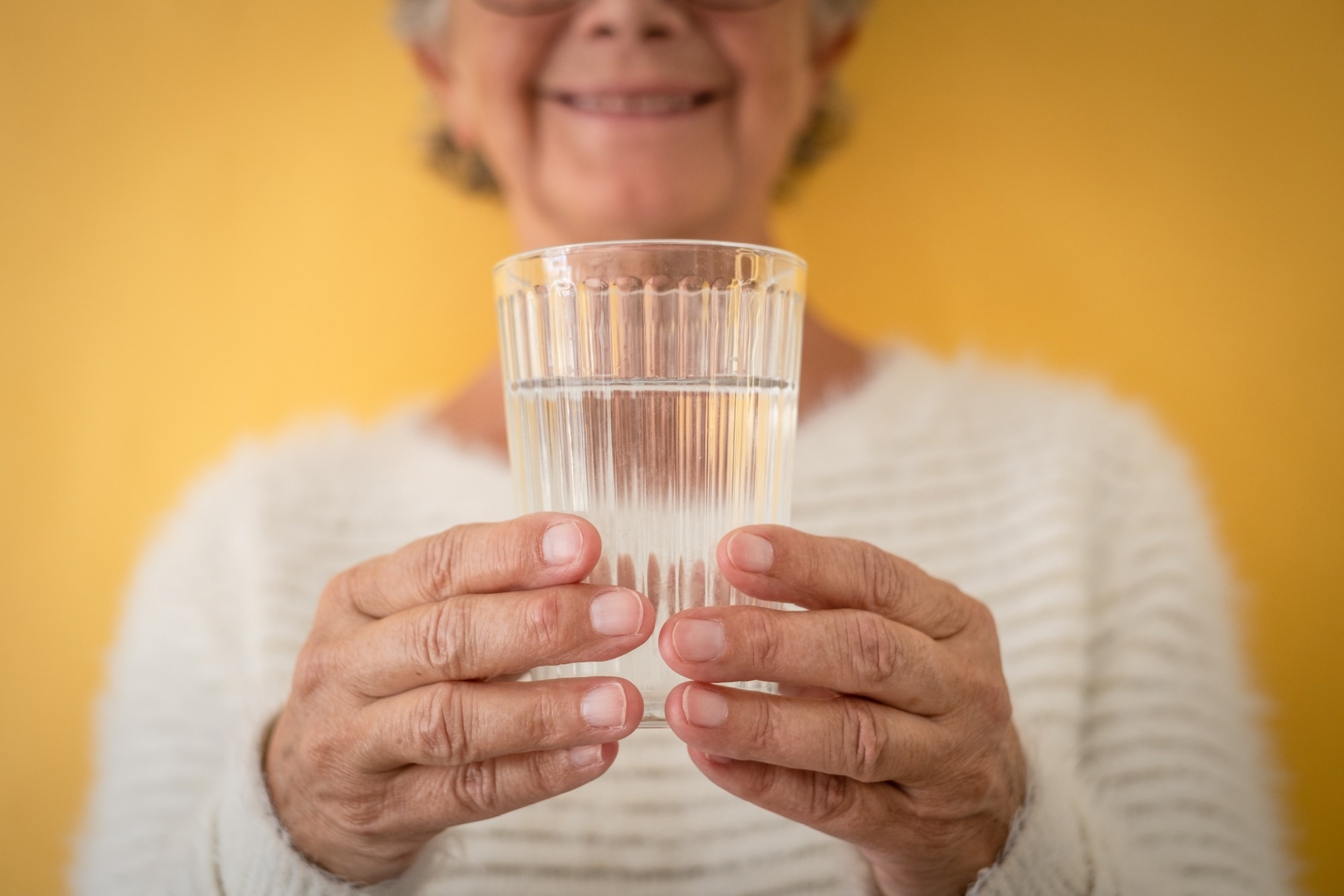A few individuals age more rapidly than others, and while some may age without any diseases, some develop chronic diseases associated with aging. Strategies and measures to retard aging processes could improve the quality of life of individuals. For example, studies have reported that reduced hydration activates degenerative mechanisms and reduces lifespan in mice.
“The results suggest that proper hydration may slow down aging and prolong a disease-free life,” said Natalia Dmitrieva, Ph.D., a study author and researcher in the Laboratory of Cardiovascular Regenerative Medicine at the National Heart, Lung, and Blood Institute (NHLBI).
 Study: Middle-age high normal serum sodium as a risk factor for accelerated biological aging, chronic diseases, and premature mortality. Image Credit: Lucigerma / Shutterstock
Study: Middle-age high normal serum sodium as a risk factor for accelerated biological aging, chronic diseases, and premature mortality. Image Credit: Lucigerma / Shutterstock
About the study
In the present study, researchers investigated whether lower hydration levels are associated with accelerated aging.
Data were obtained from the ARIC (atherosclerosis risk in communities) study cohort of middle-aged individuals (n=15,752, aged 45.0 years to 66.0 years) who were followed up for 25 years and from Bio-LINCC (national heart, lung and blood institute biologic specimen and data repository information coordinating center). Blood was drawn from the participants, and serological sodium levels were measured to represent hydration. The outcome variables were chronic disease development and any-cause death, and serum sodium level was the exposure variable.
In addition, the biological age (BA) was calculated based on 15 biomarkers, including cardiovascular biomarkers such as systolic blood pressure (cardiovascular), renal biomarkers such as eGFR (estimated glomerular filtration rate), urea nitrogen, cystatin-C, uric acid, and creatinine, and respiratory biomarkers such as FEV (forced expiratory volume). Additionally, metabolic biomarkers such as cholesterol, glucose, glycated albumin, fructosamine, and glycated hemoglobin (HbA1c), and immunological/inflammatory biomarkers such as albumin, C-reactive protein (CRP), and beta 2-microglobulin were analyzed.
Cox proportional hazards modeling was performed to test the association between serum sodium levels and mortality and chronic diseases and that of BA with the two outcome variables. Hazard ratios (HR) were calculated, adjusting for sex, race, and smoking status. Cross-sectional multivariable logistic regression modeling was performed to assess the association between serum sodium level and biological age. The team excluded individuals with blood glucose levels >140 mg/dL and mean BMI (body mass index) values >35 at the first and subsequent visits.
For calculating BA, individuals on antihypertensive and cholesterol-decreasing medications (n=6,956) were also excluded. For the chronic disease outcome variable, diseases such as HF (heart failure), dementia, CLD (chronic lung disease), diabetes, stroke, PVD (peripheral vascular disease) with claudication, hypertension, and AF (atrial fibrillation) were considered. The Web of Science and PubMed databases were searched with no language restrictions for studies assessing the link between hydration and aging and studies in which BA was estimated relative to sodium levels. Search terms included ‘hydration,’ ‘serum sodium,’ ‘biological aging,’ ‘chronic diseases,’ ‘mortality,’ and ‘aging.’
Results and discussion
At baseline, the sample population comprised 11,255 individuals aged 57 years on average, of whom 53% were female, and 80% were Whites. At the fifth visit, the mean participant age was 76 years, 56% were female, and 82% were Whites. The fifth visit cohort comprised fewer smokers and more hypertensive individuals. Middle-age serological sodium level >142.0 mmol/l was linked to a 39% greater risk of developing chronic disorders (HR 1.4), and levels >144.0 mmol/l were linked to a 21% greater risk of early death (HR 1.2).
Individuals with serological sodium levels >142.0 mmol/l showed ≤50% greater odds of being biologically older compared to the chronological ages [odds ratio (OR) 1.5], and greater BA was related to more significant chronic disease development risks (HR 1.7) and premature death (HR 1.6). In addition, the least number of deaths was observed among individuals with serum sodium levels of 137.0 to 142.0 mmol/l (n=8,604, 26%), with greater mortality among those with serum sodium 135.0 to 136.50 mmol/l (n=122, 39%,) and levels of 144.5 to 146.0 mmol/l (n=397, 35%).
Individuals with serological sodium levels of 138 to 140 mmol/l were at the least risk of chronic disease development, with elevated sodium levels associated with a greater risk of ≤39% of developing chronic diseases. Serological sodium >140 mmol/l was associated with ≤63% greater odds of chronic disease development compared to 138 to 140 mmol/l sodium levels. Individuals with serological sodium in the upper limit of the normal range had greater BA compared to their chronological age.
Analyzing 70-year to 90-year-olds attending the fifth visit evaluation demonstrated that individuals with greater BA than chronological age (Q3 and Q4 group individuals) had ≤44% greater risk of chronic disease development than Q1 group individuals. The odds of greater BA than chronological age were higher by 10% to 15% among individuals with serological sodium levels >142 mmol/l and by 50% for levels >144 mmol/l than those with serological sodium levels of 137 to 142 mmol/l. In the literature search, many observational studies reported the associations of hydration markers with the risk of developing HF, metabolic diseases, and death.
Studies have reported higher sodium levels to be associated with lower fluid consumption. Lesser hydration increases the tonicity of blood, 95% of which is represented by sodium, and activates neurohumoral water conservation mechanisms. Consequently, lesser volumes of concentrated urine are excreted from the human body. Lower hydration reportedly activates age-accelerating pathways, including pro-coagulation and pro-inflammatory processes in the vascular endothelium, deoxyribonucleic acid (DNA) injury, oxidation of proteins, metabolic remodeling, and cell senescence.
Overall, the study findings showed that reduced hydration could accelerate aging. Individuals with middle-aged serological sodium levels exceeding 142 mmol/l were at a greater risk of being biologically older, developing chronic disorders, and dying at a lower age.